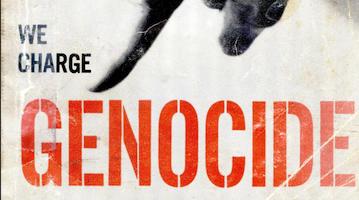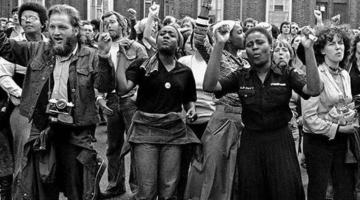Nationalism, racism, sexism, homophobia, and other forms of oppression and exclusion are an integral part of the neoliberal order.
“Neoliberalism is an attempt to impose a weird kind of moral order on the world, which promises limitless free choice but actually sets the vast majority of us up to fail.”
In this series, we ask acclaimed authors to answer five questions about their book. This week’s featured author is Adam Kotsko. Kotskois s on the faculty of the Shimer Great Books School of North Central College. His book is Neoliberalism's Demons: On the Political Theology of Late Capital.
Roberto Sirvent: How can your book help BAR readers understand the current political and social climate?
Adam Kotsko: My book aims to provide a new way of looking at the political-economic order known as neoliberalism. At least among people who acknowledge that neoliberalism is “a thing,” it is usually regarded as purely a question of economic policy—pushing free markets wherever possible, pursuing deregulation and tax cuts, favoring the rights of capital over workers, and building a globalized economy where everyone conforms to the same “best practices.” What I try to show is that neoliberalism is much more than that. It is an attempt to impose a weird kind of moral order on the world, which promises limitless free choice but actually sets the vast majority of us up to fail. By looking at neoliberalism from this moral angle, I am also able to show how nationalism, racism, sexism, homophobia, and other forms of oppression and exclusion are an integral part of the neoliberal order. This also helps us to make sense of the ways that Trump and other right-wing reactionaries are actually much more neoliberal than they want to let on. In fact, I originally conceived the project in the summer of 2016, when Clinton’s victory seemed all but assured and Trump appeared to be a vanity candidate at best, but after the disastrous result of the election, I found that the concepts of moral entrapment that I had developed helped me to understand what was going on around me—so hopefully my readers will have a similar experience.
What do you hope activists and community organizers will take away from reading your book?
In a sense, my book is not telling activists or community organizers anything they don’t know—no one understands the depth and magnitude of the problems we face, and the ways they fit together and reinforce each other, better than people on the front lines. And as someone whose strength lies more on the theoretical side than in practical activism, I would not presume to tell activists how (or even whether) they should use my book. What I hope it provides, though, is first of all a language that captures the overlapping mechanisms that the neoliberal order uses to trap us, to “hook” us with its own destructive standards, and to get us to look at any bad outcome as somehow our own fault rather than a systemic problem. A friend of mine who works in Christian ministry shared with me how reading my book helped him think differently about a debt-relief program he was organizing. Many members of the organizing group wanted to include some kind of accountability mechanism, to make sure that their limited funding went to the most deserving candidates—an understandable impulse. But after reading my book and thinking about the logic of entrapment, my friend saw that that “common sense” desire would actually wind up setting people up to fail. In other words, it would be more about giving them a reason not to provide needed help. In the end, they decided to err in favor of generosity. We all need to find ways of unlearning those neoliberal habits of entrapment in our everyday interactions with each other—above all people who are trying to build communities that will provide an alternative to our systems of domination.
We know readers will learn a lot from your book, but what do you hope readers will un-learn? In other words, is there a particular ideology you’re hoping to dismantle?
Beyond the habits I mention above—the ways that we scapegoat and shame ourselves and others due to destructive and self-undermining notions of individual responsibility—I set out in the book to undo a number of clichés related to neoliberalism. The first is the idea that neoliberalism is a purely economic movement that only relies on the state in moments of “hypocritical” necessity. In reality, such critiques depend on the very “division of labor” between economy and state that neoliberalism itself puts forward, and more importantly, they miss the way that economic and state powers collaborate to control us. The second is the notion that neoliberalism is a cosmopolitan, “color-blind” ideology, so that nationalism, racism, sexism, homophobia, and other forms of oppression or exclusion are somehow anachronistic in the neoliberal age. By contrast, I aim to show that neoliberalism was always about reinforcing patriarchal, heterosexist white supremacy from the very start. Finally, I aim to disprove the common idea that Trump represents some kind of alternative to, or at least break with, the neoliberal status quo. While he does represent a change, it is more a matter of doubling down and intensifying the worst aspects of neoliberalism—something that can also be said of right-wing reactionaries more generally. Any real alternative to neoliberalism has to come from the left, pure and simple.
Who are the intellectual heroes that inspire your work?
I could talk a lot about the intellectual influences who are reflected in my work, but I think the real heroes are the people who inspired me in the classroom. My high school English teachers—especially Mrs. Herfert and Mr. Ricketts—taught me to love writing as an analytical tool, and college professors like Rebecca Belcher and Craig Keen helped me deepen those skills and connect them to contemporary questions of social justice. Above all, it was my grad school mentors like Ted Jennings, Laurel Schneider, and Joanne Terrell who modeled a vision of scholarly rigor that was adventurous and creative while also being accountable to communities seeking social justice. Most of them have published great writings, but their work as mentors and teachers is where they made the biggest impact on me.
Outside the teachers I have met personally, one of my earliest intellectual inspirations was Dietrich Bonhoeffer, who provided a model for taking seriously the radical demands of the gospel in a way that has integrity and relevance for the modern world. While I no longer identify as a believer, I still keep returning to Bonhoeffer’s work and example—including in the conclusion to Neoliberalism’s Demons, where he is the last major figure I discuss.
In what way does your book help us imagine new worlds?
The reason I brought up Bonhoeffer at the end of my book was to discuss his concept of a “world come of age”—in other words, a world where humanity takes responsibility for itself and for shaping its own world. He saw a world like that taking shape in the waning years of WWII, but in many ways the neoliberal revolution was a step backwards, dismantling structures of collective agency and decision-making that were beginning to develop in the postwar era. The result has been a world where we are more aware than ever of the pressing problems of white supremacy, economic exploitation, and environmental destruction—and yet the political-economic system seems ever more incapable of delivering the solutions that people need and demand. The world come of age moved back into its parents’ bedroom, outsourcing the most important decisions to the fiction of the “invisible hand.” While most of my book is critical, I do conclude with a more speculative note, challenging us to imagine what it might mean for us to give up on self-destructive notions of purely individual agency and to start developing new modes of collective agency. I don’t know in detail what the alternative to neoliberalism looks like, but I do know that it won’t emerge out of our consumer choices or even our votes—it will come from finding new modes of relating to each other that go beyond the blame and shame that so thoroughly saturate the neoliberal culture that surrounds and forms us.
Roberto Sirvent is a teacher living in California.
COMMENTS?
Please join the conversation on Black Agenda Report's Facebook page at http://facebook.com/blackagendareport
Or, you can comment by emailing us at comments@blackagendareport.com



















